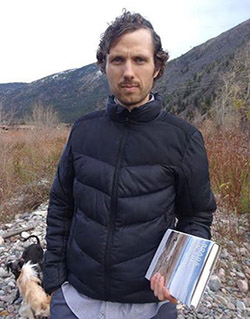Historian at WSU to Discuss Early Mormon Leaders’ Role Governing Land and Spiritual Lives
 OGDEN, Utah — When the Mormon pioneers arrived in the Salt Lake Valley and Great Basin in 1847, they envisioned not only a living place but a well-ordered place, says Jedediah Rogers, co-managing editor of Utah Historical Quarterly and editor of the recently published “The Council of Fifty: A Documentary History.”
OGDEN, Utah — When the Mormon pioneers arrived in the Salt Lake Valley and Great Basin in 1847, they envisioned not only a living place but a well-ordered place, says Jedediah Rogers, co-managing editor of Utah Historical Quarterly and editor of the recently published “The Council of Fifty: A Documentary History.”
On Jan. 25 at 7 p.m. at Weber State University’s Hurst Center Dumke Legacy Hall, Rogers will discuss how the secret Mormon political organization — the Council of Fifty — ensured spiritual and environmental order. He also places the council in a broader context of western American history.
Mormon church leader Joseph Smith founded the Council of Fifty shortly before his death in 1844. Under Brigham Young, the council became the governing body for a brief few years in what would become Utah Territory, passing laws and statutes, acting as the judicial authority and overseeing the growth of Salt Lake City.
Rogers says there was a notion that Upper California, the Far West and, most particularly, the eastern rim of the Great Basin were regions without pasts, without histories.
“The Salt Lake Valley was, for Young, a blank canvas on which God could realize his handiwork: to organize a new society, to ensure that its citizens and the land confirmed to divine decree,” Rogers said.
In addition to judicial authority, the council also had the responsibility of domesticating wild lands.
“In council deliberations we see this impulse to shape not just human behavior but also the land itself,” Rogers said. “As the municipal government during the first couple of years in the Salt Lake Valley, the council organized a public two-month hunt to eradicate wild animals considered to be a nuisance and threat to public safety.”
Rogers says Mormons brought with them religious beliefs about the land and their role on it.
“They may have looked forward longingly to the millennial day when the high places would be made low and the crooked places straight, but they didn’t have to wait,” he said. “Their work was to realize that dream. It was a spiritual and temporal endeavor, and it gave meaning and vitality to the act of settlement and survival in this region.”
Rogers’ lecture is part of the Weber Historical Society Spring 2016 Lecture Series. It is presented by the WSU Alumni Association, the College of Social & Behavioral Sciences, the Department of History, Stewart Library and the Weber Historical Society.
Visit weber.edu/wsutoday for more news about Weber State University.
Amy Hendricks, Office of Marketing & Communications
801-626-6346 • amyhendricks@weber.edu- Contact:
Jedediah Rogers, co-managing editor of Utah Historical Quarterly
801-245-7209 • jedediahrogers@utah.govEric Swedin, associate history professor
801-395-3553 • eswedin@weber.edu
